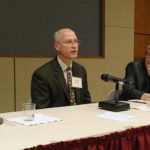A woman prays the rosary across the street from a Planned Parenthood clinic in southeastern Pennsylvania as a belligerent state lawmaker taunts and berates her unceasingly while videotaping his rant. He shouts, “Shame on you!” repeatedly and chastises her, the Catholic Church and pretty much any Christian who opposes abortion. He calls them pseudo Christians. The woman calls the police on her cell phone and tells her persecutor to get the video camera out of her face. Otherwise, she continues her prayers, peacefully but clearly trying to steel herself against the diatribes. She takes the high road, the approach of active nonviolence, turning the other cheek as Jesus did.
A few weeks earlier, on Holy Thursday, the same state legislator videotaped his harassment of a group of five prolife activists, which included three teenage girls, praying peacefully across the street from the Planned Parenthood clinic. He tried to shame them and to frighten them. He enticed his online audience with the promise of a donation of $100 to Planned Parenthood on behalf of anyone who would identify the teens. After enduring his threats and intimidation, the small pro-life group left the area, without responding verbally to his attacks. They took the high road, brushing the dust off their shoes as the apostles did in the early days of the church.
Six weeks ago, the Vatican hosted a workshop on the theme “Path of Nonviolence: Towards a Culture of Peace” organized by the Dicastery for Promoting Integral Human Development and Pax Christi’s Catholic Nonviolence Initiative (CNI). The conference’s participants “noted that nonviolence is not only a method but a way of life, a way to protect and care for the conditions of life for today and tomorrow,” Cardinal Peter Turkson said in his opening remarks. The conference focused on current situations of conflict and violence around the world. The sidewalk across the street from a Planned Parenthood clinic in the United States is among the places where this “way of life” plays out.
The practice of active nonviolence requires courage, patience and humility. Each of the pro-life activists demonstrated those virtues, setting an example for the rest of us. Public outrage over the treatment of the peaceful protestors resulted in a rally that drew deeply divided, angry partisans – people who advocate for the unborn child and people who advocate for the right to abort that child. Did the rally advance the dialogue, the willingness of the opposing sides to work together to foster peace and to support every life — from womb to tomb?
Supporters of the Catholic Nonviolence Initiative call on the church to continue developing Catholic social teaching on nonviolence and to integrate Gospel nonviolence explicitly into the life and work of the church through dioceses, parishes, agencies, schools, religious orders and voluntary associations, among others.
The Catholic Nonviolence Initiative looks at nonviolence from a global perspective: abolition of war and of nuclear weapons, nonviolent resistance, trauma healing, unarmed civilian protection, conflict transformation and peacebuilding strategies. CNI supporters hope and pray for Pope Francis to write an encyclical on nonviolence. These are admirable goals that deserve our attention and support.
But Catholic nonviolence must begin at home, on the sidewalks outside an abortion clinic, in the public square, in our schools and universities. We take the high road, which means resisting the kneejerk reaction. We take time to learn the story of the angry state legislator to get to the root cause of his anger. Then we can begin a dialogue that changes hearts about the value and dignity of every life.
Barb Arland-Fye, Editor
(arland-fye@davenportdiocese.org.)











